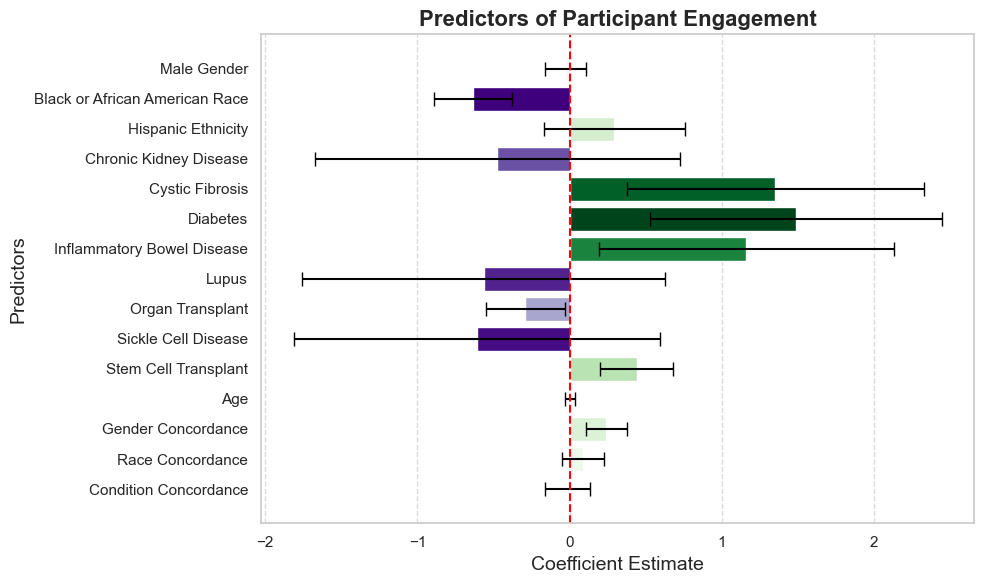Children with Chronic Conditions 3
Session: Children with Chronic Conditions 3
461 - Predictors of Participant Engagement in a Peer Coaching Program for Adolescents and Young Adults with Chronic Medical Conditions
Monday, April 28, 2025
7:00am - 9:15am HST
Publication Number: 461.6247
Noah Prizant, Duke University School of Medicine, Durham, NC, United States; McLean D.. Pollock, Duke University School of Medicine, Durham, NC, United States; Sharron L. Docherty, Duke University School of Nursing, Durham, NC, United States; Gary Maslow, Duke University School of Medicine, Durham, NC, United States

Noah Prizant, noah.prizant@duke.edu (he/him/his)
Medical Student
Duke University School of Medicine
Durham, North Carolina, United States
Presenting Author(s)
Background: The transition from pediatric to adult care is critical for adolescents and young adults (AYAs) with chronic conditions, who face challenges in managing disease burden, medication, and lifestyle changes. PiCASO (Peer i-Coaching for Activated Self-Management Optimization) is a peer coaching intervention designed to facilitate this transition through guidance from trained peer coaches (ages 18-26) via a secure telephone/text interface. Robust participant engagement is essential for success.
Objective: This study investigates how demographic factors, chronic conditions, and mentorship factors influence engagement.
Design/Methods: Phone and text data were collected over 12 months from the PiCASO trial intervention group. Engagement was defined by the number of coaching calls (greater than 5 minutes) per participant. Key variables included participant demographics (age, gender, race, ethnicity), medical condition, mentor identity, and coach-participant demographic concordance. A Poisson multivariable regression was performed to identify predictors of engagement.
Results: The study involved 129 participants and 29 peer coaches, exchanging a total of 1,871 coaching calls and 13,664 text messages. Participants averaged 15.1 coaching calls and 104.3 text messages over the course of the study, with coaching calls averaging 27.5 minutes. Multivariable regression analysis revealed that race was associated with engagement, as well as certain chronic diseases having significant associations with engagement: Cystic Fibrosis (β = 1.3506, p < 0.01), Diabetes (β = 1.4834, p < 0.01), Inflammatory Bowel Disease (β = 1.1586, p < 0.05) and Stem Cell Transplant (β = 0.4391, p < 0.001). Specific mentors displayed statistically significant positive effects on engagement with their participants, however no mentors exhibited significant negative effects. Gender concordance was also found to positively influence engagement (β = 0.2416, p < 0.001).
Conclusion(s): This study underscores the importance of demographic and disease factors on engagement in AYA peer support interventions. Participant race and chronic condition, including Cystic Fibrosis, Diabetes, Inflammatory Bowel Disease and Stem Cell Transplant, were found to be significant predictors of engagement in peer coaching. Specific mentor effects and gender concordance also contributed to increased engagement. These findings emphasize the need for tailored peer coaching strategies to enhance engagement, address disparities, and support AYAs in their transition to adult care.
Predictors of Participant Engagement
 Bar plot showing predictors of patient engagement (coaching calls >5 minutes) from Poisson regression analysis, with coefficients and 95% confidence intervals. Significant predictors include participant race, chronic conditions (Cystic Fibrosis, Diabetes, Inflammatory Bowel Disease, Stem Cell Transplant), mentor identity, and gender concordance.
Bar plot showing predictors of patient engagement (coaching calls >5 minutes) from Poisson regression analysis, with coefficients and 95% confidence intervals. Significant predictors include participant race, chronic conditions (Cystic Fibrosis, Diabetes, Inflammatory Bowel Disease, Stem Cell Transplant), mentor identity, and gender concordance.
